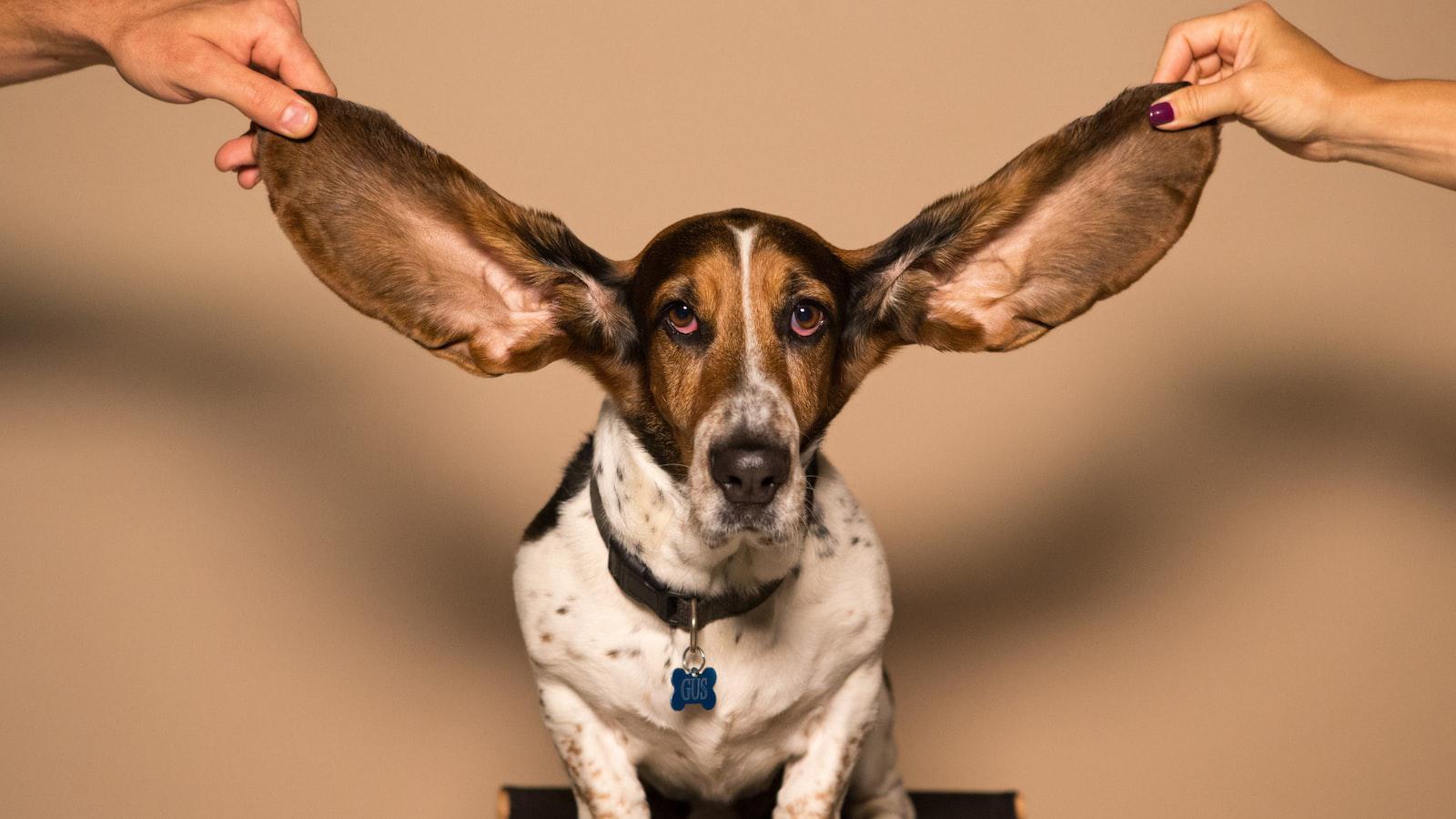Have you ever experienced the sudden, surprising jolt of pain when a dog unexpectedly nibbles on your ears?
It’s one of those puzzling moments that can leave you wondering, “Why do dogs bite my ears?”
Read on to find your answers.
Why do Dogs Bite My Ears?
Dogs and their curious behavior never cease to amaze us.
One peculiar and often puzzling habit that some dogs have is biting their owner’s ears.
If you’ve ever experienced this, you may have wondered why your furry friend enjoys nibbling on your precious ears.
There are actually some fascinating reasons behind this odd behavior.
Firstly, it’s important to understand that dogs explore the world through their mouths.
Puppies, in particular, are forever teething, and just like babies, they use their mouths to alleviate the discomfort.
So when your pup starts nibbling on your ears, it could be a sign that they are going through a teething phase.
The softness and pliability of your ears may provide them with the perfect relief.
However, do keep an eye on this behavior, as excessive biting could be a sign that your puppy needs appropriate chew toys to redirect their teething behavior.
Secondly, dogs are social creatures, and they often demonstrate their affection through gentle nibbles and licks.
When a dog bites your ears, it may simply be their way of showing love and bonding with you.
Just as they may nuzzle against you or lick your face, nibbling on your ears can be their unique way of reciprocating the love and attention you give them.
So don’t be surprised if your furry friend tries to cozy up to you by giving your ears a playful nibble.
Lastly, it’s essential to consider that every dog is different.
Some breeds have a predisposition for nibbling behaviors more than others.
For example, breeds such as retrievers or pointers, which were originally bred as hunting dogs, may have a stronger instinctual urge to bite or mouth.
It’s crucial to remember that this behavior is not necessarily aggressive or meant to cause harm.
However, if the ear biting becomes excessive or starts to hurt, it’s essential to redirect their attention towards appropriate toys and provide them with positive reinforcement when they exhibit gentle behaviors.
Canine Ears, A Multifaceted Communication Tool
Another reason why dogs may bite your ears is because for them, ears are a communication tool.
From a dog’s perspective, their ears are like a secret code that they use to interact and express themselves.
Just like our vocal cues or body language, dogs rely on their ears to convey messages to us and other animals.
Those adorably floppy or perky ears are not only used for hearing but also play a crucial role in their overall communication:
Listening Intently: Dogs are known for their exceptional hearing abilities and can detect sounds that are beyond our human range.
Their ears act like radars, pivoting in different directions to capture every sound around them.
By twitching or perking up their ears, dogs can locate the exact source of a noise and gather important information about their surroundings.
Displaying Emotions: Have you ever noticed how a dog’s ears can vary in position depending on their mood?
When a canine friend is relaxed and content, their ears tend to hang naturally.
On the other hand, if they feel threatened or anxious, their ears may flatten against their head, signaling fear or unease.
So, the next time you’re petting a dog, pay attention to their ears, and you might just decipher how they’re feeling!
Signaling Intentions: Dogs also use their ears to communicate their intentions to other dogs or even humans.
An upwardly tilted ear can indicate curiosity or engagement, while a sharp forward-pointing ear could denote alertness or attentiveness.
Being aware of these subtle cues can help us understand our furry companions better and respond appropriately.
What Triggers Ear Biting in Dogs?
So, what exactly triggers dogs to bite our ears in the first place?
Here are some possible causes:
1. Playful Behavior Gone a Little Too Far
One of the most common reasons behind dogs biting ears is simply playful behavior.
Puppies, in particular, use their mouths to explore the world around them, just like human babies do.
So when we playfully interact with our dogs, they may get a little carried away in the excitement and accidentally nip our ears.
This kind of biting is usually not harmful and should be seen as a natural part of their playtime.
However, it’s important to gently discourage this behavior to avoid any potential harm or discomfort.
2. Teething Troubles
Similar to human babies, puppies also go through a teething phase where their baby teeth are replaced by adult teeth.
During this time, their gums can become sore and itchy, leading them to chew on anything they can find for relief.
This includes our ears!
So if you notice your dog showing a keen interest in biting your ears, it might be a sign that they are teething.
Providing them with appropriate chew toys and redirecting their attention to these toys can help save your ears from becoming their favorite teething ring.
3. Stress or Anxiety
Believe it or not, ear biting can sometimes be a result of stress or anxiety in dogs.
Just like humans, dogs can experience anxiety from various factors such as changes in their environment, separation from their owners, or even loud noises.
When they feel overwhelmed, dogs may resort to unusual behaviors like ear biting as a way to cope with their emotions.
If you suspect your dog’s ear biting is stemming from stress or anxiety, it’s essential to address the underlying cause and work on creating a calm and secure environment for your furry friend.
Tips for Preventing Ear Biting Incidents
Some cheeky dogs just can’t resist sinking their teeth into our poor, defenseless ears!
It can be a surprising and uncomfortable experience, to say the least.
But don’t worry, there are plenty of tips and tricks you can try to prevent those ear-biting incidents and keep your ears safe and sound!
1. Teach the “leave it” command: This is a handy skill for your pup to know.
When they start getting nibbly with your ears, firmly say “leave it” and redirect their attention to an appropriate chew toy or treat.
By teaching them to obey your direction, you can control their behavior more effectively.
Using positive reinforcement techniques, such as treats and praise, will help your dog understand what you want from them and make the training process more enjoyable for both of you.
2. Provide suitable chew toys: Dogs love to gnaw, so make sure they have a variety of chew toys to sink their teeth into.
Opt for toys that stimulate their interest and soothe their gums, such as rubber bones or puzzle toys filled with treats.
Keeping their jaws occupied with approved items will reduce the temptation to nibble on you.
3. Socialize and train your dog: A well-socialized dog is less likely to resort to ear-biting.
Expose your pup to different environments, people, and animals from an early age.
This helps them understand proper behavior and develop a healthy respect for humans and their extremities.
Training classes can also be beneficial for both you and your dog, as they provide guidance on how to discourage unwanted behaviors like ear biting.
By implementing these tips, you can help curb those ear-biting incidents and create a safe and happy environment for both you and your dog.
Remember, training your dog to stop biting your ears requires time, effort, and lots of patience.
Be consistent in your approach, and don’t get discouraged if progress is slow.
Seeking guidance from a professional dog trainer can also be beneficial if the behavior persists.
With persistence and love, you can help your furry friend develop better habits, ensuring a harmonious relationship for years to come.
FAQ
Q: Why do dogs feel the urge to bite ears, even gently?
A: First of all, it’s important to remember that dogs are natural explorers.
Just like they sniff and investigate their surroundings, they also use their mouths to explore new objects, textures, and yes, even our ears!
Biting ears, even gently, is often an instinctive behavior for our playful pooches.
Q: Is there a specific reason they target our ears?
A: Dogs are smart, curious creatures, and they’re most likely just drawn to our ears because they’re so different from their own.
Our ears are soft, move around, and sometimes even wiggle when we talk or engage in lively conversations.
From a dog’s perspective, they’re exciting and worthy of investigation!
Q: Is there any significance behind the playfulness of ear-biting?
A: Absolutely!
When dogs bite or nibble on our ears, it’s usually a playful act intended to grab our attention or initiate a game.
Playful biting is typical behavior for dogs, especially during their puppyhood.
It’s their way of engaging with us, bonding, and showing affection.
Q: Should I be concerned if my dog bites my ears too hard?
A: While dogs usually exhibit gentle ear-biting, it’s essential to ensure they don’t get too overzealous and accidentally cause pain or injury.
If your dog bites too hard or becomes too rough, it’s crucial to redirect their behavior towards other toys or appropriate objects.
This will help them learn acceptable boundaries during playtime.
Q: Can my dog’s ear-biting be a sign of aggression?
A: In most cases, no.
Playful ear-biting is generally harmless and not a sign of aggression, but rather a form of communication and bonding.
However, if you notice any aggressive or possessive behavior, such as growling, snapping, or biting forcefully, it may be wise to consult a professional dog trainer or behaviorist.
Q: How can I discourage my dog from biting my ears?
A: Teaching your pup appropriate behavior should always be a part of their training.
Offer them various chew toys that they can bite on instead of your ears.
Additionally, reinforcing positive behavior and redirecting their attention towards more suitable playtime activities will go a long way in curbing excessive ear-biting.
Q: Are there any health concerns associated with dog ear-biting?
A: Generally, dog ear-biting is harmless and doesn’t pose any health risks.
However, it’s essential to maintain good hygiene and cleanliness to prevent any potential infections.
Regularly clean your dog’s mouth, ensure your ears are clean and healthy, and consult your veterinarian if you have any concerns.
Q: Can I train my dog to stop biting ears completely?
A: While it might be difficult to train your dog to completely stop biting ears, you can always redirect their behavior towards more appropriate objects and discourage excessive biting.
Consistent training, positive reinforcement, and patience will help your pup understand and respect the boundaries you set.
Q: Can ear-biting ever be a sign of affection from our furry friends?
A: Absolutely!
Ear-biting can be seen as a playful gesture and a sign of affection from your furry companion.
Just like humans engage in playful banter or tickle fights to express affection, dogs may view nibbling on your ears as their unique way of showing love and ensuring they have your full attention.
Remember, every dog is different, and what may be true for one pooch may not apply to another.
The most crucial aspect is to understand and appreciate your dog’s individual behavior, keeping in mind their comfort, safety, and overall well-being.
So, next time your fluffy pal decides to nibble on your ear, embrace the joyful connection and cherish the silly moments with your furry friend!
In Conclusion
Now, don’t fret if your furry friend has a penchant for nibbling on your lobes; you’re certainly not alone in this peculiar predicament.
Our furry companions, with their curious nature and love for exploration, often find our ears irresistible targets. But fear not, for there are reasons behind this peculiar behavior.
One possible explanation is that dogs view our ears as intriguing protrusions that warrant further investigation.
Just like their inquisitive nature leads them to sniff and investigate new scents, our ears become an irresistible pathway for their playful exploration.
It’s their way of familiarizing themselves with this fascinating part of our body.
Another factor to consider is that dogs are exceptionally social creatures, and they use various means to communicate with us.
When a dog playfully nips at your ear, it may very well be their way of seeking attention or expressing their affection.
It’s like they’re saying, “Hey, human! Pay attention to me! I love you!”
Of course, it’s crucial to remember that dogs are individuals with their unique personalities and experiences.
While some may find joy in gently tugging at our ears as a form of interaction, others might do so out of boredom or even as a signal for more serious underlying issues.
In such cases, it’s essential to consult a professional trainer or veterinarian to address any potential concerns.













